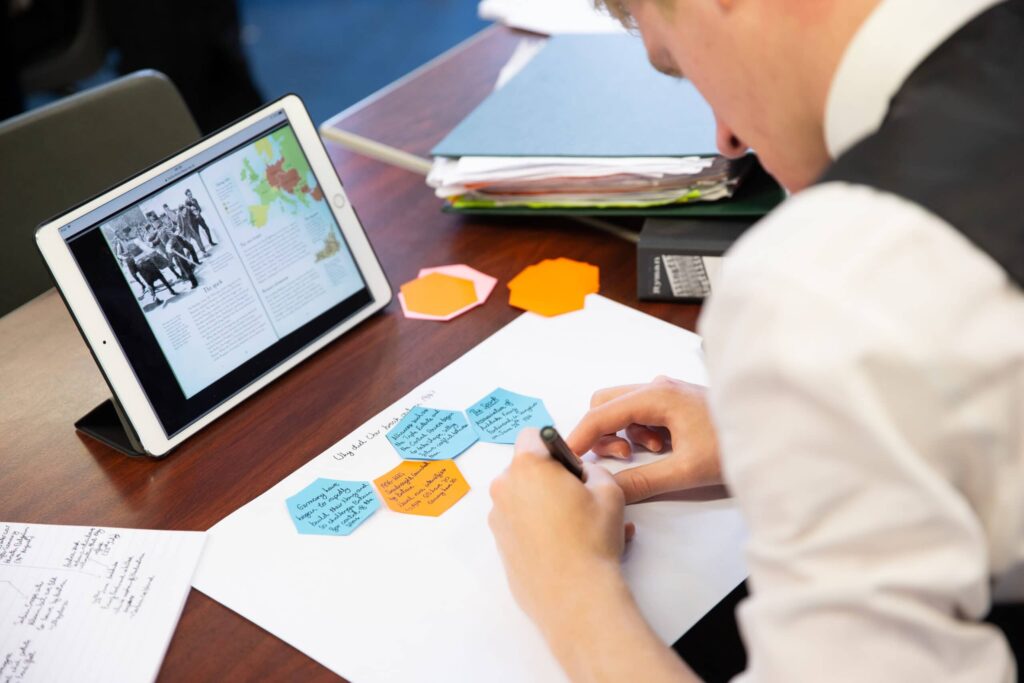Adapted from a talk given by Dr Jonathan Beale and Dr Christina Hinton at the Shipley Annual Conference, Pennsylvania, in September 2021.
Dr Jonathan Beale was Researcher in Residence at Eton and now teaches at Sevenoaks. Dr Christina Hinton is CEO of Research Schools International and part of the Human Flourishing Program
UNESCO states that ‘Human Flourishing is… the central purpose of education’
(de Rutyer et al. 2020)[1]
How can we best support the flourishing of school students?
Promoting flourishing in schools rests on the following assumptions: that we support students to build a strong identity which is founded on good character and virtue; we encourage students to foster close relationships and feel a sense of belonging in their school community and we want students to be happy and healthy. Furthermore, in terms of their studies, we want them to be intrinsically motivated to learn and to find meaning and purpose in their work.
Research Schools International and the Human Flourishing Program have identified some activities which can be implemented in schools to help students flourish.
What does it mean to flourish?
The Positive Psychology Centre quantifies this in terms of: positive emotion, engagement, positive relationships, meaning, accomplishment.
The Human Flourishing Program defines this in terms of: happiness and life satisfaction, mental and physical health, meaning and purpose, character and virtue and close social relationships.
Activities to help support flourishing in schools:
- Gratitude
Studies such as those by P. C. Watkins (2014) explore the links between gratitude, wellbeing and human flourishing.[2] One strategy involves the teacher encouraging students to note down things that they are thankful for and to revisit/add to them regularly.
- Acts of kindness
Teachers can ask students to share examples of various acts of kindness they have observed and to replicate these in their daily lives (Fowler and Christakis, 2008).[3]
- Volunteering
Teachers can remind students that giving back to the community can be highly rewarding, either through established school volunteering programmes or more informal student initiatives (Santini et al., 2018).[4]
- Nurturing positive relationships
Teachers can encourage older students to engage in ‘mentoring programmes’ with younger students, particularly at the start of the year. Teachers can model how to form positive relationships with pupils, for example by getting to know them individually (Padilla-Walker et al., 2017).[5]
- Mindfulness
It has been argued by Cathy Atkinson that ten minutes of mindfulness a day can help promote student wellbeing and this is supported by a study conducted by the Mindful Schools program. [6] There are a number of short online mindfulness courses which you can do with students during tutorials or even at the beginning/end of lessons, such as these by Positive Psychology.
- Exercise
Regular exercise can help to promote new neural connections in the brain which can help stimulate learning. Encourage students to engage in exercise that they enjoy or to take regular walking breaks during the day. You can also try to make your lessons more active with a ‘hands on’ approach (Leibow et al., 2021).[7]
- Imagining one’s best possible self
To promote this, you can try activities with your students which use prompts:
‘Think about your life in the future, imagine everything has gone as well as it possibly could. You have achieved all of your life goals and ambitions. What does this look like?’
Then ask students to work back and consider what they need to do to get there. This is particularly effective in a tutorial-style setting (King, 2001). [8]
If you would like to watch the full talk, you can do so here.
[1] Doret de Ruyter, Lindsay Oades and Yusef Waghid, ‘Meaning(s) of Human Flourishing and Education’, ISEE Assessment (2020), Available: <https://en.unesco.org/futuresofeducation/sites/default/files/2021-03/Flourishing%20and%20Education_ISEEA%20Research%20Brief.pdf> Accessed: 22 September 2021.
[2] P.C. Watkins, ‘Gratitude and the good life: Toward a psychology of appreciation’, (2014), Springer Science and Business Online, Available: <https://doi.org/10.1007/978-94-007-7253-3> Accessed: 23 September 2021.
[3] James H. Fowler and Nicholas A. Christakis, ‘Dynamic Spread of Happiness in a Large Social Network: Longitudinal Analysis Over 20 Years in the Framingham Heart Study, (2008), British Medical Journal, Vol. 337, pp.1-9
[4] Ziggi Ivan Santini et al., ‘Formal Volunteer Activity and Psychological Flourishing in Scandinavia: Findings from Two Cross-sectional Rounds of the European Social Survey’, (2018), Social Currents, Vol. 6, pp. 255-269.
[5] Laura M. Padilla-Walker, Madison K. Memmott-Elison and Larry J. Nelson, ‘Positive Relationships as an Indicator of Flourishing During Emerging Adulthood’ in Flourishing in Emerging Adulthood: Positive Development During the Third Decade of Life, (New York: Oxford University Press, 2017).
[6] Cathy Atkinson, ‘Measuring the Effectiveness of a Mindfulness-based Intervention for Children’s Attentional Functioning’, Educational and Child Psychology, Vol. 33, pp. 51-64.
[7] Michael S. Leibow et al., ‘Exercise, Flourishing, and the Positivity Ratio in Seventh-Day Adventists: A Prospective Study’, (2021) American Journal of Health Promotion, Vol. 35, pp. 48-56.
[8] L. A. King, ‘The Health Benefits of Writing about Life Goals’, (2001), Personality and Social Psychology Bulletin, Vol. 7, pp. 798–807.




